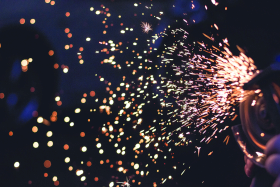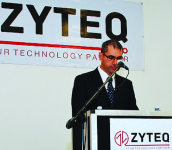

The South African security industry is fortunate to have a number of local manufacturers who have not only held their own in a highly competitive market over many years, but even made names for themselves overseas. Hi-Tech Security Solutions interviewed three such companies to learn more about what products they make, what challenges they face, and what opportunities are out there.
What the companies manufacture locally
Centurion Systems specialises in access control and automation products. The vast majority of these are manufactured locally, including many of its gate motors, traffic barriers, GSM solutions, intercom systems, remote controls and receivers.

“From initial design right through to production, we ensure that our products are versatile and robust enough to serve virtually any market,” says communications coordinator Charl Mijnhardt. “We currently export to over 70 countries worldwide, which is testimony to how adaptable our products are. Our brand essence is to make life easier for both installers and the end consumer, so in terms of benefits, we count innovations such as easy setup via LCD interfaces and mobile apps, simplified maintenance and, of course, exceptional after-sales support.”
Currently Centurion Systems’ manufacturing facility has 20 production lines; these can be grouped into four main areas, namely computer numerically-controlled (CNC) machinery, surface-mount technology (SMT), electronics assembly, and mechanical assembly. Additionally, it has implemented advanced robotics which are used in the assembly of its access automation solutions.
Collectively, Centurion manufactures in excess of 272 000 sub-assemblies per month, which are required for final assembly. This in turn translates into 82 000 finished products per month, and considering that most products are hand-assembled on semi-automated production lines this is quite an impressive accomplishment.
Almost all the tools and jigs used for assembly are designed, built and maintained in-house by Centurion’s own production support department. This has led to a competitive advantage for Centurion as there is very little downtime while waiting for machinery to be repaired. In addition, it leads to the development of innovative ways to assemble and test finished products.
Local makes good, twice
Zyteq Fire can trace its origins back to the days of Ziton, a specialist fire detection company which was founded in Cape Town in 1969. After growing substantially over the years into an export business and a dominant player internationally, Ziton was sold onwards a couple of times, and the brand is currently under the ownership of UTC Fire & Security.
This left the plant in Cape Town at something of a crossroads. At its height it employed close to 300 people and exported 80% of what it made, and former management and staff now took it into their hands to start Zyteq. The company’s emphasis is still on the fire detection market, but it also has a contract electronics manufacturing (CEM) division that serves the broader South African electronics industry.

“We’re feeding the manufacture or our own fire detection products into our contract manufacturing lines,” explains managing director Mark Mundell, “so we’re essentially our own customer, which is exactly what we always wanted but it’s taken us a while to get to this point.”
The standard that governs the fire detection products made by Zyteq is EN 54, which is effectively adopted in its entirety by the SABS (South African Bureau of Standards) in the form of SANS (South African National Standards) EN 54.
Since Zyteq was only founded in 2014 and brand new equipment was put in at that time, most of the effort and investment that’s happened over the years has been dedicated to addressing other business factors. “Where we have invested heavily is in our systems, processes and procedures, and there we’ve come a long way. We’re heavily invested in those areas, because we’re obviously ISO certified but we’re also EN 54,” Mundell says.
Technoswitch, a South African manufacturer, importer and distributor of fire detection and suppression equipment, turned 45 this year. It was founded in 1974 by JM Wachter with the focus being the design and manufacture of fire alarm control panels. In addition to supplying its own manufactured product line to the fire industry, Technoswitch has also become the primary distributor of a number of leading international brands. These additions have resulted in the company having a product portfolio which is able to cover domestic, commercial, industrial and mining applications.
Despite the addition of these international brands, Technoswitch also designs and manufactures in excess of 50 different products for the fire detection and suppression industry at its headquarters in Honeydew, Johannesburg. The products being manufactured are conventional fire control panels, extinguishing control panels, power supplies, customised fire detection and control equipment, and numerous fire detection and suppression interfaces and peripherals. All these products are used in a variety of industries, with the majority being installed in the mining and industrial environments as a result of their proven reliability.
There are challenges, but also opportunities
In what may come as a surprise to many, Mijnhardt says Centurion Systems does not face any particular challenges when it comes to recruiting qualified technical people. “South Africa has so many gifted people possessing diverse skills, that we have access to a vast pool of qualified individuals who each bring their own unique skills to the table. From our support technicians right through to our production staff, our people are as world-class as our products,” he says.
Some years ago, Centurion embarked on a production efficiency programme, run through the Department of Trade and Industry called The Workplace Challenge. Its objective is to empower the company’s employees to be more involved in the decisions made in the business, drive innovation and leadership, and help in the skills development and upliftment of the workforce.
“This has given Centurion the edge in terms of the quality and delivery of our products to the end-users. The employees go the extra mile to improve their work area and their productivity, and are proud to have their name associated with the individual products that they produce,” Mijnhardt says.
The fact that Centurion’s products are built to withstand harsh African conditions has opened up opportunities in a number of export markets and demanding applications. These include export to South America, for example, as well as installation on sites such as mines. Since its products are frequently installed outdoors, it ensures that they are capable of weathering various environmental conditions.
“As with any undertaking, there will always be things that could make the running of the business easier,” Mijnhardt summarises “That being said, the company has thrived for the past 30 years despite the often tumultuous and unpredictable economic environment, so we have the adaptability and resilience to deliver industry-leading products even when faced with significant challenges.”
Local support put Zyteq on track
Mundell says that, although it was a very stressful transition period when the Ziton business was lost, the DTI (Department of Trade and Industry) and the IDC (Industrial Development Corporation) stepped up and played a crucial role in enabling Zyteq’s future. “We’d already started engaging with the DTI to try and save that plant, and we were well supported in terms of funding to assist with the R&D.; It didn’t cover all the costs but it did help that we got some funding to design our own products, and the IDC granted us a loan to fund our factory.
“So those two entities really helped us get off the ground and they’ve been very supportive through the process, because on the R&D; side we decided to create a completely new, highly innovative platform.” That proved a lot harder than one might think, because there are no accredited testing houses in South Africa, meaning that although Zyteq’s products are designed and manufactured locally, they have to be sent to Europe for testing and certification.
In terms of finding people with the right skills, he says it is generally not a problem, but the underlying reason for that is an unfortunate one. “All of our staff comes from our old factory, so in a way we’re lucky that we had an existing pool of people that we could bring over. Sadly though, when we employ contractors they are ex-Ziton people who are still unemployed five years down the line.”
The big push for Zyteq now is on the fire detection side, and Mundell believes there’s a big opportunity in the market. “It’s tight at the moment but that may play into our hands a little bit, because being a local manufacturer we can control our costs a lot better. On the contract manufacturing side, the security market is doing well – predominantly new-generation products with a focus on IoT (Internet of Things), rather than the old-school security stuff,” he says.
ISO certified

“At this point, Technoswitch is only exporting its locally manufactured products into sub-Saharan Africa, however our long-term goal is to also move into the European markets with the new products currently under development,” says Brett Birch, the company’s managing director. “This objective was also one of the main reasons we invested heavily into our quality management system (QMS), and we obtained our ISO 9001:2015 certificate in January 2016 – the first South African company to achieve ISO 9001 certification to the 2015 edition of the standard.
“Although Technoswitch always had an informal QMS in place, the ISO 9001:2015 certification has given our clients a lot more confidence in our product offering and it has helped streamline our processes and made us more efficient; which is extremely valuable, especially in the current economic climate.”
Birch says one of the main reasons Technoswitch has been able to continue its manufacturing presence is that it is operating in a niche market and has gained years of relevant industry experience. This experience translates into the ability to develop products for its client base from the concept stage, which will also comply with the relevant industry standards.
“At the same time, we have remained flexible and are able to customise our products when required. This is a significant advantage as most international companies tend to be more rigid in this regard and are not willing to perform any customisation on their products,” says Birch.
For more information contact:
• Centurion Systems, +27 11 699 2400, [email protected], www.centsys.co.za
• Technoswitch, +27 11 794 9144, [email protected], www.technoswitch.co.za
• Zyteq Fire, +27 21 761 3980, [email protected], www.zyteqfire.com
| Tel: | +27 11 699 2400 |
| Email: | [email protected] |
| www: | www.centsys.com |
| Articles: | More information and articles about Centurion Systems |
| Tel: | +27 11 794 9144 |
| Email: | [email protected] |
| www: | www.technoswitch.co.za |
| Articles: | More information and articles about Technoswitch Fire Detection & Suppression |
| Tel: | +27 21 761 3980 |
| Email: | [email protected] |
| www: | www.zyteqfire.com |
| Articles: | More information and articles about ZYTEQ Fire |
© Technews Publishing (Pty) Ltd. | All Rights Reserved.